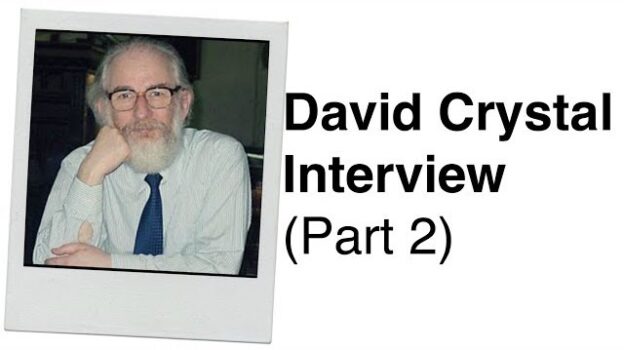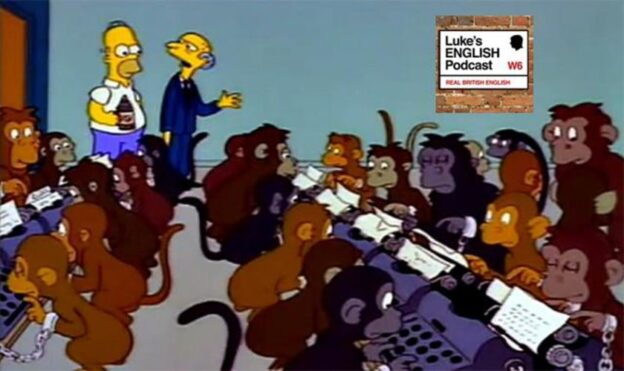Part 2 of the mystery story which I started in the previous episode.
 [DOWNLOAD] [LISTEN TO PART 1] [FREE AUDIOBOOK OFFER]
[DOWNLOAD] [LISTEN TO PART 1] [FREE AUDIOBOOK OFFER]
Part 2 of the strange story from the last episode. Use this podcast to improve your listening, reading, vocabulary and pronunciation. You should listen to it after listening to the previous episode “Mystery Story / Narrative Tenses”.
This episode of the podcast is continues the story of the last episode. Find out the answers to the mystery of the strange Doctor.
This podcast includes:
- Lots of very descriptive language – learn how to describe people, places and feelings
- Complex sentences and examples of effective use of narrative tenses
- Clear pronunciation in a couple of slightly different accents – raise your awareness of connected speech and intonation
- Some amusing cultural information about London’s heritage – learn more about the culture of the language
How to use this podcast to improve your English:
I recommend that first, you listen to the podcast and just follow the story. Second, listen to pick up language – use the tapescript if you like. Third, pronunciation – use the script to copy sentences from the story. Fourth, record yourself telling the story, and try to make it sound really interesting, and alive and funny. Listen to yourself and do it again, focussing on the weak points from the first time. You will improve more quickly, and develop an instinct for the structure of the language, which helps you make quick decisions about what is right and wrong in English. There is no other way to do it: exposure to natural English is very important in learning the language.
So, now! Enjoy the story…
The Man & The Moon, part 2…
When I arrived home that night, I immediately wrote everything that had happened into my diary.
“I could make a great podcast out of this”, I thought to myself…
The next day I told my friend what had happened.
“I know just the person who can help you!” he said, “There’s a man who lives in Baker Street, in the centre of London”, he said.
“Yes, I know where Baker Street is – it’s quite a famous street y’know”
“Yes! Anyway, this man is the best detective in London! He’s the most brilliant mind there is. The police have to use him to solve all their crimes, and some say that even the Queen asks him for help when she has lost her TV remote control down the back of the sofa! You should go and visit him. I’m sure he’ll be able to help you.”
I took the address and immediately went to Baker Street on the underground. I took the Picadilly Line from Hammersmith, and changed at Green Park station, but the Jubille line was closed, so I had to get back on the Picadilly Line and then change at Leicester Square onto the Northern Line, but that was delayed due to engineering works and a signal failure at Waterloo station. But finally, after an hour an a half on the underground, I arrived at Baker Street. I found the address: Flat number 21b and knocked on the door. An elderly woman answered.
“Yes?” she said.
“Umm, hello, I’m here to get some help. A friend told me to come”
“Alright, come in then.”
We walked through into the hallway. I could smell pipe tobacco, and what sounded like a cat being murdered in the next room. Then I realised it was a violin being played, very badly.
The woman knocked on the door of the front room, and the violin stopped playing.
“There’s a man here to see you” “Yes, yes, I know” said a loud, commanding voice from inside the room. “Show him in Mrs Hudson, thank you”
Mrs Hudson stepped aside, and I walked into the room.
I immediately felt nervous and awkward. There, standing at the fireplace was a very unique looking man. He was tall and thin, and old. I’m not sure how old he was exactly. His hair was going grey, and his skin was wrinkled, but his eyes were bright and youthful. He could have been as old as 80, but he had the spirit of a much younger man.
He was wearing a brown suit, with a waistcoat, and long leather winter boots. In his hand, he was holding a Stradivarius violin, of very fine quality. On the mantelpiece next to him was a smoking pipe.
“Umm, my friend Smith recommended you. He said that you would be able to assist me” I said.
“Smith? Hmmm?” said the man. “And…?”
“Oh, and, well, the thing is, I need your help… it’s…”
“Well, what do you think Watson?” Said the man, quickly, and only then did I realise that there was a third person in the room. To my right, in a dark leather armchair, there was a red faced man, probably about 65 years old. He had a large brownish red moustache which covered his top lip. In his hand was a large glass of Brandy, and in his other hand, a cigarette. He seemed very comfortable, as if he had just woken up from a lovely sleep by the fire”
“Huh…? Oh, hello! How do you do?” he said, smiling at me and yawning.
“What do you think Watson?” Snapped the man with the violin.
“Oh, err… a student? Perhaps a waiter… erm… ah! An unemployed librarian!”
“No no no! Watson. Completely wrong! Don’t overcomplicate matters! Now, let me try…”
I stood there, feeling confused. The tall man looked at me. “Your name is Thompson, am I right?”
“Well, how on earth did you guess…?”
“Not a guess Mr Thompson… Not a guess… Allow me to demonstrate something for you, if I may”
I stood in silence. I was in the presence of a great mind, I could understand that now.
“Let me see…”
He looked me up and down for a second.
“I would say that you are an English teacher… of no more than 10 years experience, but no less than 5. Let’s say 8 and a half years.”
I was gobsmacked.
“You worked in the far east, didn’t you?” “In Japan?”
“yes! Yes I did!”
“Kanagawa prefecture?”
“Oh my god, yes!”
“Now, I suppose something happened to you, near the river, which you don’t understand, and you need answers, so your friend told you to come and see me so I could sort it all out for you, is that right?”
“Oh – My – GOD! How did you know…? It must be magic, or … a trick!”
“Alright, I’ll tell you” he said, with a bored look on his face.
“Using simple empirical methods of observation and deduction, the truth will almost always reveal itself to you as the most reasonable answer. You just look at the evidence, and think logically. Usually, the simple answer is the best.”
“Would you like a cup of tea? He might take a while” It was Mrs Hudson.
“Oh, yes please” “two sugars”…
The man continued… “One simple look at your hands revealed your occupation. Your nails are badly chewed and damaged. This must be due to stress. A common problem for any teacher, but especially one that has to deal with demanding students from different countries who all want to know about the difference between all the past perfect continuous passive conditional verb tenses, and adjectival noun phrases and reduced non defining relative participle clauses and such matters.” I looked at my fingers, he was right. The nails were a terrible mess… “I saw also that your hands are very dirty with blue and red ink. This must be from using whiteboard marker pens. You write on the board, and in your haste you make a mistake, and then quickly rub it off with your hand, hoping that no-one notices…”
“Umm, yes, that’s true.”
“That’s the evidence which told me that you must be an English teacher.”
“Wow!” I said
“Yes, that and the fact that you’re holding a copy of New Headway Upper Intermediate Teacher’s Book by Liz and John Soars, which kind of gave it away… oh, and Watson googled you before you arrived, but anyway… On your face I noticed wrinkles – around your mouth and eyes. This is from smiling all the time, to keep your students happy, is it not?”
“Yep. Well done. Right again”, I said, sipping my tea, getting a little impatient. “Umm, sorry but could you hurry up a bit? It’s just that this is going to be a really long podcast, and I don’t want anyone to stop listening…”
“Yes yes! I counted the wrinkles on your face, and estimated that since graduating from university, you have been smiling at students for exactly 8.5 years. Simple: Count the wrinkles on the face, divide by 5 (the average teaching hours per day) and the result: 8.5 years.”
“Fair enough” I said.
“And when you entered the room, you bowed slightly. This must be body language which you picked up while living in Japan.”
“Yep. Well done… very good”
I was getting annoyed and impatient. I gulped down my sugary tea.
“OK, you’ve convinced me, you’re a brilliant detective. Now, will you help me out please, Mr…?”
“It’s Holmes, Sherlock Holmes, and this is my companion, Dr Watson”
“Wow, it really is Sherlock Holmes”, I thought. “I’ve read so much about him, but I never thought he was real! And his faithful companion Dr Watson! Fantastic!” I looked again at Watson. He was fast asleep in his chair.
“WAKE UP WATSON!” shouted Holmes, throwing a chess piece at him. It bounced off Watson’s head, and he woke up suddenly, and smiled at me sleepily. “So, how can we help you then Mr Simpson?”
“It’s Thompson you fool!” Shouted Holmes quickly” “And we must hurry to the riverside in Hammersmith immediately! There’s another mystery to solve! Come Watson!”
“How did you know it was Hammersmith…?”
“Oh, never mind…” said Holmes.
The three of us jumped in a cab on Baker Street and drove to Hammersmith bridge. On the way there, I told Holmes about how I’d sat down by the river the night before, how it had been a full moon, how a green monster had nearly grabbed me, how I’d heard weird noises and seen a strange blue light and how I’d been saved by a mysterious man called The Doctor. When we arrived I took Holmes and Watson to the spot where everything had happened. A cold chill ran down my spine as I remembered it all again.
“This is where it happened Mr Holmes” I said.
“Excellent” Said Holmes, a magical light shining in his eyes. “Stand back! I shall investigate the area.”
“He always does this” Said Watson. “He’ll be busy for an hour or two I reckon.”
Holmes was bent over, studying the ground next to the river with a magnifying glass. Occasionally he stopped suddenly, and picked something up and placed it carefully in his pocket. He walked close to the water and looked in. He looked up at the sky and down at the river again. He sniffed the air with his big nose. He picked up a stone and dropped it into the water, and then went back to look at the steps where I had been sitting the night before.
Watson yawned, and said to me “There’s a pub over there, fancy a pint while Holmes does his investigation stuff?”
Watson pointed at a pub called The Black Lion. “Umm, alright. Yeah, why not!?” I replied.
“We’re just off for a pint in that pub” shouted Watson.
“Hmmm” said Holmes, as he studied some markings on the ground.
Watson and I sat in the pub next to the fire, and made small talk.
“So, you’re a doctor, are you?”
“Yes, that’s right”
“Hmm, that’s interesting…”
“Yeah, it’s alright, I suppose. Most of the time I just hang out with Holmes to be honest. Do a bit of writing. That sort of thing. It’s pretty boring really. I like a quiet life, you know?”
“Yeah, I suppose so. The man I met last night said he was a doctor. You don’t know who he is, do you?”
“A doctor? Doctor who?”
“I don’t know, he didn’t say his name. He just said ‘you can call me The Doctor…’ and then he disappeared. It’s really annoying…”
ly: ‘book antiqua’, palatino;”>Just then Holmes burst into the room.
“Come with me Watson, we must walk up the river bank and investigate the mud near the sewage outlet for evidence!”
“Umm, do we have to? I mean, why don’t we just stay here in the pub, and you go and look in the mud near the sewage outlet? How about that?” said Watson, sipping another pint of beer and warming his feet by the fire.
“Oh Watson, you stay here then, if you must. Your love of the local Chiswick ale will be the end of you Thompson, what about you? Fancy getting up to your knees in mud??”
“Erm, I think I’ll stay here with Watson actually, if that’s all right.”
“Fine, stay here, both of you! I shall return within one hour.”
59 minutes and 59 seconds later, Holmes returned. His leather boots were covered in brown mud, and he had a grim look on his face. He suddenly looked much older, and tired. I was a little bit worried about him.
< /p>
We took a cab back to Baker Street and Holmes remained quiet and moody for the whole journey. I stared out of the window and dreamed about the present perfect continous passive tense. Watson fell asleep.
When we got in, Mrs Hudson brought us some cake and Watson opened the drinks cabinet. “Brandy anyone?” he said, pouring himself a large glass.
Holmes ignored him, and sat in his chair, smoking his pipe.
For what felt like 2 hours, Watson drank brandy and nodded off by the fire, while Holmes sat silently in the chair surrounded by clouds of his own smoke, his face tight with concentration. The sun went down, and Holmes stayed in the chair, and his pipe smoke stretched outwards across the room, running along the ground and wrapping itself around my legs like claws. The moon shone in through the window, and I began to fall asleep.
Suddenly Holmes jumped out of his chair, a young man again. The room seemed brighter.
“THOMPSON! I have solved your mystery!” Shouted Holmes, confidently!
“Wow, that was quick!” I said. I looked over at Watson. He was fast asleep.
Holmes proceeded to walk around the room, rubbing his hands and laughing to himself.
“So! What’s it all about??” I asked, impatiently.
“I have read about cases such as this before Thompson, and I have been very much looking forward to having the opportunity of working on one myself. And this Doctor of yours… well, I never thought I would be lucky enough to…”
“To what?? I asked… just tell me what’s going on, please! This is going to be such a long podcast, and I’m really worried that all my listeners will be really bored, and they’ll stop listening, and, there’s not enough pedagogical content, and…”
“ENOUGH!” Shouted Holmes. “I will explain everything. You would be wise to listen carefully. I have looked at the evidence, which has been presented to me. There wasn’t much, but there was enough. First, you told me that this happened near the river. Inspection of the riverbank revealed several things to me.”
“I discovered some vital clues. I found two green hairs, which must have come from the ‘monster’ which you talked about. I checked the hairs, and they perfectly match hairs which have been discovered near the Thames before. They are hairs from a lunaris goblarmunas – a moon goblin!”
“Yes, I already know that! What the hell is a Moon Goblin!”
“Oh, it’s a monster which lives in the water, and which comes out when there’s a full moon to eat people. They worship the moon, and some people say that they are aliens which once lived on the moon, but they escaped to earth millions of years ago when the moon lost its atmosphere.”
“Oh, right… wow, I never knew about that. How did they travel to the earth, through space”
“Oh, err, well, they’re actually robots”
“Robots, what do you mean?”
“Oh never mind, it’s too difficult to explain…Yep, it’s true, there’s loads of them in the Thames. They’re responsible for a lot of stuff actually. The Queen knows all about it, so does the Prime Minister…”
“They do?”
“Yeah. Anyway, when I investigated the mud up the river, I noticed that there were lots of goblin footprints. They’re very active. In fact, there’s many more of them than I first thought. I will have to tell her majesty all about it. She will want to know.”
“I’m sure she will… Anyway, what about this Doctor guy…”
“Oh yes, while you and Watson were having such a lovely time in the pub, I inspected the area near where you were sitting last night. I found some very interesting scratches on the ground. They were blue scratches. They must have been caused by something very heavy, blue in colour, and square in shape.”
“What, like a big blue box?” I said.
“Exactly Thompson! Exactly!” I estimate that it was similar in size to a telephone box. It must have been there for a moment, and then it moved away quickly.
“So you’re telling me there was a big blue telephone box there one minute, and then the next minute it was gone?”
“Precisely”
“I also found some footprints near where the box had been. Those must have been the footprints of your Doctor. The size of the feet match the description you gave me. I also found this lying on the ground, near where the blue telephone box had been”
He showed me a silver ticket. It was a concert ticket, made of an amazing shiny material. It said “Prince Michael Jackson II – Live in Concert – Wembley Arena September 16th 2021”
“Oh my god! Prince Michael II? That’s Michael Jackson’s son! But, how is this possible!? How can the doctor have a ticket for a concert from the future?”
“Let me explain. Look at the evidence. The goblins from space, the blue ‘telephone box’, the strange sound, the blue flash of light, the man who called himself the doctor who appeared and disappeared out of nowhere, the thing he pointed at that goblin, the special knowledge he had about the moon goblins, the ticket from the future. It all means one thing.”
“What!? What does it mean?!” I demanded.
Holmes stared at me with dark eyes. Watson snored in the corner of the room.
“There is no other answer. The Doctor you told me about. Well, he must be a Timelord.”
“What? Is that your answer? What the hell is a Timelord?” I asked him.
Holmes stood up, and said.
“If you want to find out, then YOU’LL HAVE TO LISTEN TO THE NEXT EPISODE OF LUKE’S ENGLISH PODCAST!!!!”
I sighed with frustration.
“Don’t worry Thompson.” Said Holmes. “I know an expert on Timelords, and he will tell you everything he knows about The Doctor. Just wait for the next episode of the podcast, and you’ll learn everything.”
I left 21B Baker Street wishing I had never gone there in the first place. Holmes wasn’t quite the brilliant man I thought he was, but I was still determined to get to the bottom of this mystery. I had managed to get some answers: The Doctor was a Time Lord who travelled around through space and time in a blue telephone box. That explained the strange light, the sound, and how The Doctor appeared and disappeared so quickly. But who was he really, where had he come from and what on earth was going on?”
With the address of the Timelord expert in my hand, I jumped on a number 27 bus towards Hammersmith, desperately hoping to get some final answers to this mystery, and silently hoping that none of my listeners got really bored with this stupid Sherlock Holmes story and stopped listening and decided to unsubscribe from Luke’s English Podcast because it’s gone a bit strange, and where are the phrasal verbs and idiomatic expressions that he said he would teach us…? I decided that I had to end this mystery as soon as possible, and then I could go back to teaching useful expressions and pronunciation… But before that, I was determined to find out about Timelords, and The Doctor… I arrived at the address, and went inside to meet the Timelord expert who Holmes had recommended…
To be continued…
-

-
The Black Lion pub
-







 If you like ukulele music, listen to the end of this episode!
If you like ukulele music, listen to the end of this episode!

